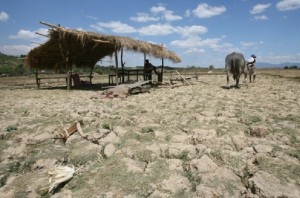A power crisis seen to hit during the summer months coupled with the dry spell due to El Niño might push the prices of basic commodities upward, according to the National Economic and Development Authority (Neda).
However, Neda Director General and Economic Planning Secretary Arsenio M. Balisacan said the overall outlook for the rate of increase in prices of basic goods “remains well-anchored as policies continue to be supportive of a stable inflation rate.”
“While the current episode of mild El Niño and power woes still pose risks to inflation, the continuing efforts to ensure that appropriate policy actions are implemented are expected to temper inflationary pressures over the near- to medium-term,” he added.
Last March, an inflation rate of 2.4 percent was registered, down from 3.9 percent in the same month last year and 2.5 percent in February.
Balisacan attributed the slower rise in prices to a downward trend in food prices, especially of the staple rice as well as meat.
“The easing annual growth rate of rice prices was supported by favorable total rice stocks inventory,” Balisacan explained. “Food inflation could have been lower if not for the relatively higher prices of vegetables and fish, which is due in part to the likely shift in consumers’ preferences given the onset of the Lenten season.”
The commitment from bakers that they would bring down bread prices on the back of lower production and transportation costs because of cheaper oil also helped temper inflation, Balisacan said.
For the Neda chief, “[t]he continuing decline in international oil prices is also a positive development for the country considering our dependence on imported oil.”
The average headline inflation from January to March was 2.4 percent, or within the 2 to 4 percent target of the government for 2015.
“Inflation remained low and stable in the first three months of the year in line with expectations over the policy horizon, which is likely to support consumption growth,” Balisacan said.
Also, “[a] relatively stable peso, given the country’s strong external position on the back of strong remittances, rising BPO (business process outsourcing) earnings and FDI (foreign direct investment) inflows, ample international reserves and a manageable level of external debt contribute to stable domestic prices,” the Neda chief noted.
